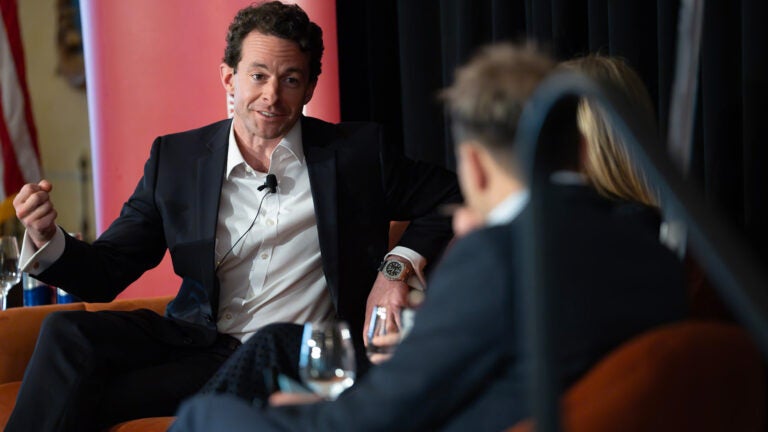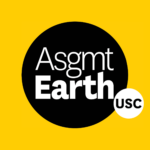
Former US presidential advisor and alumnus returns to campus to spark clean tech innovation
By 2030, Holcim, one of the world’s largest manufacturers of building materials, will swap 1,000 of their diesel trucks for zero-emission vehicles. Microsoft has pledged to purchase nearly 300 million tons of carbon dioxide removal credits over the next 11 years.

These commitments, and many more, arose from their participation in the First Movers Coalition. Comprising more than 100 of the world’s largest corporations, the coalition has made commitments to buy next-generation clean technology goods and services in industries like steel and shipping. The idea is that this large-scale demand will ramp up production, lower the cost of these goods and help build a more sustainable market.
It’s a project developed in part by David Livingston, who graduated from the USC Dornsife College of Letters, Arts & Sciences with a bachelor’s degree in international relations in 2010.
Livingston served as a senior advisor and managing director for energy in the Office of the Special Presidential Envoy for Climate, then headed by U.S. Secretary of State John Kerry, where he helped launch initiatives like the coalition.
He recently helped USC students learn how to advance this sort of forward-thinking, market-friendly environmentalism by serving as the inaugural innovation and sustainability practitioner in residence, based out of the USC Dornsife Environmental Studies program.
“I’m passionate about the environment, not just from an angle of conservation, but also on the frontiers of societal and technological change,” he says.
First, California; next, the world
Livingston’s interest in nature began early. He grew up in California and his childhood included frequent backpacking trips through the Sierra Nevada with his father and uncles. His mother nearly lost her home in the 2017 Tubbs Fire in Northern California, and the families of many of his friends were not so lucky. These experiences grounded him in the beauty, but also the fragility, of nature on a changing planet, he says.
As an undergraduate at USC, Livingston learned, though, that a nation’s natural resources are also crucial to its success.
A class on the political economy of the Soviet Union taught by Robert English, associate professor of international relations, Slavic languages and literature and environmental studies, gave him insight into the crucial role Russia’s aluminum and nickel industries have played in their economy — and politics. Livingston wrote his senior thesis on how these sectors influenced Russia’s approach to climate policy and carbon markets.
By his senior year, Livingston realized his curiosities were at a global scale. “I have a big appetite for the world, and I couldn’t think of myself as pinned down to just one region, or one country or one culture,” he says. Solutions to climate change, which touches every part of the Earth and requires both private and public solutions, was a perfect career focus.
After graduation, Livingston completed a stint as a Carnegie Endowment Junior Fellow before receiving a master’s degree from the University of Oxford in 2013. He then worked for a number of organizations, including the Eurasia Group, where he conducted trend research, and the World Trade Organization and the United Nations, researching trade and industrial policy.
“It’s been a really rich tapestry of different career opportunities, across very different sectors and modalities, tackling this challenge,” he says.
In 2020, Livingston joined the Biden administration, working as a senior advisor to Secretary Kerry, who was U.S. Special Presidential Envoy for Climate. In addition to his work on the First Movers Coalition, Livingston worked on several other initiatives, including co-leading the creation of the Agriculture Innovation Mission for Climate.
Led by the United States and the United Arab Emirates, this coalition of more than 50 countries is working to scale up public-private partnerships and investment in climate-smart agricultural technology.
Agriculture is often overlooked in conversations about environmental innovation, where flashy electric cars and solar panels dominate consumer interest, but it’s a sector with considerable impact. It produces 10% of the world’s carbon emissions but also represents an incredible opportunity for efficiency and productivity improvements, Livingston says.
“When people think about clean tech, we want them to also be thinking about lower carbon fertilizers, drought-resistant crops, electrified tractors and farm equipment, and more,” says Livingston.
Loyal Trojan
Staying connected to USC has been an ongoing priority for Livingston. Since 2015, he’s taught classes through the USC Dornsife Washington DC Program, which brings USC students to the nation’s capital to study and work for a semester. It’s headquartered at the recently launched USC Capital Campus.
On the University Park Campus in his practitioner in residence role, Livingston taught a course on innovation and competition in the global energy transition. He also met regularly with groups at USC, like the Business of Energy Transition Initiative at the USC Marshall School of Business, to help build what he calls “sinews of intellectual engagement and cooperation,” around clean tech on campus.
Livingston’s insider experience has benefited his students, who could hear firsthand about diplomatic negotiations and global power shifts that often take place away from the public eye but have an outsize effect on our collective future.
His goal is to inspire new ideas — among both students and campus researchers — about the ways innovation and technology intertwine with and shape geopolitical discussion, cooperation and competition around climate change.
“It’s really important for tomorrow’s generation of leaders to understand the paradigm of addressing climate change by grappling with technological change and geopolitical dynamics,” Livingston says. “Understanding those underlying forces helps us be more effective at creating durable, lasting progress on climate change.”
His work as a practitioner-in-residence may have come to a close, but he’s remaining on with USC. Moving forward, Livingston will be working to advance the new Climate and Carbon Management Initiative at the USC Dornsife Wrigley Institute for Environment and Sustainability. The initiative, which recently received a $4 million gift from Ballmer Group, aims to accelerate innovation and research around decarbonization.